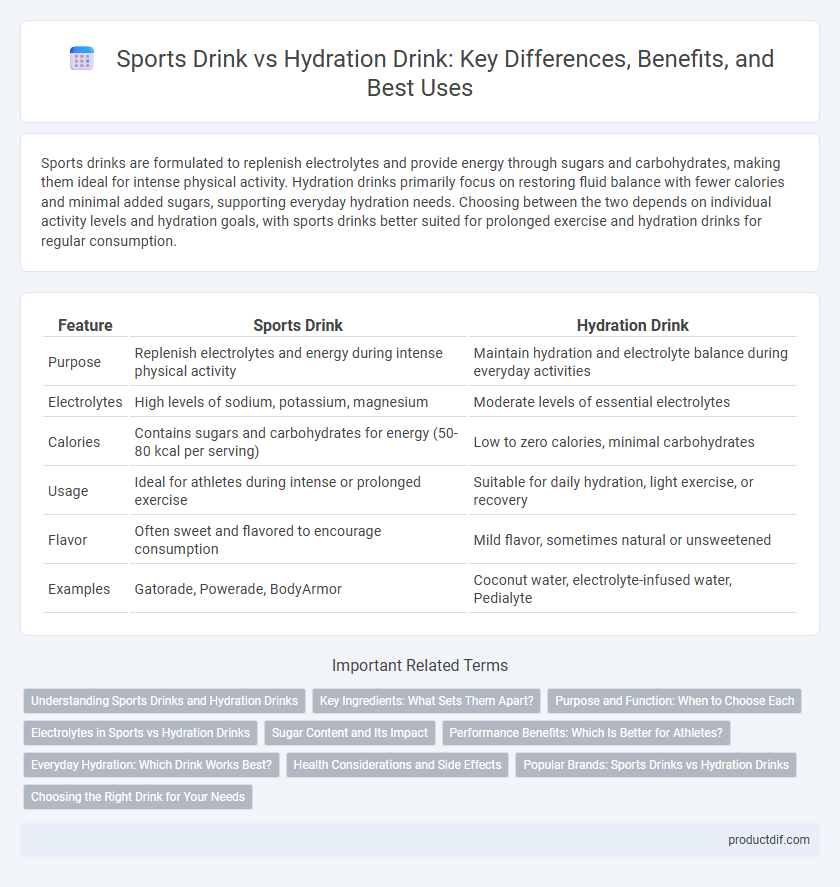Sports drinks are formulated to replenish electrolytes and provide energy through sugars and carbohydrates, making them ideal for intense physical activity. Hydration drinks primarily focus on restoring fluid balance with fewer calories and minimal added sugars, supporting everyday hydration needs. Choosing between the two depends on individual activity levels and hydration goals, with sports drinks better suited for prolonged exercise and hydration drinks for regular consumption.
Table of Comparison
| Feature | Sports Drink | Hydration Drink |
|---|---|---|
| Purpose | Replenish electrolytes and energy during intense physical activity | Maintain hydration and electrolyte balance during everyday activities |
| Electrolytes | High levels of sodium, potassium, magnesium | Moderate levels of essential electrolytes |
| Calories | Contains sugars and carbohydrates for energy (50-80 kcal per serving) | Low to zero calories, minimal carbohydrates |
| Usage | Ideal for athletes during intense or prolonged exercise | Suitable for daily hydration, light exercise, or recovery |
| Flavor | Often sweet and flavored to encourage consumption | Mild flavor, sometimes natural or unsweetened |
| Examples | Gatorade, Powerade, BodyArmor | Coconut water, electrolyte-infused water, Pedialyte |
Understanding Sports Drinks and Hydration Drinks
Sports drinks are formulated to replenish electrolytes, carbohydrates, and fluids lost during intense physical activity, enhancing endurance and recovery. Hydration drinks primarily focus on maintaining fluid balance through rapid absorption of water and electrolytes without added sugars or calories. Understanding the specific ingredients and intended use of each drink helps athletes choose the optimal beverage for performance and hydration needs.
Key Ingredients: What Sets Them Apart?
Sports drinks primarily contain electrolytes like sodium, potassium, and magnesium to replenish minerals lost through intense exercise, along with carbohydrates such as glucose or sucrose for energy. Hydration drinks emphasize balanced electrolyte levels without significant sugars, often incorporating ingredients like isotonic solutions or natural minerals to maintain cellular hydration. The key difference lies in the carbohydrate content and electrolyte concentration, where sports drinks boost energy and recovery, while hydration drinks focus on fluid balance and rapid hydration.
Purpose and Function: When to Choose Each
Sports drinks are formulated to replenish electrolytes, carbohydrates, and energy lost during intense physical activity or endurance training, making them ideal for athletes engaged in prolonged, high-intensity workouts. Hydration drinks primarily focus on rapid fluid absorption and maintaining optimal hydration levels, suitable for casual exercise, everyday hydration, or recovery from mild dehydration. Choosing between the two depends on exercise duration, intensity, and specific nutritional needs to optimize performance and recovery.
Electrolytes in Sports vs Hydration Drinks
Sports drinks contain higher concentrations of electrolytes like sodium, potassium, and magnesium to replenish minerals lost through intense exercise and promote muscle function. Hydration drinks typically offer moderate electrolyte levels designed for everyday fluid replacement and maintaining balanced hydration during low to moderate activity. The elevated electrolyte content in sports drinks supports rapid recovery and prevents cramping, whereas hydration drinks focus more on sustained fluid balance.
Sugar Content and Its Impact
Sports drinks typically contain higher sugar levels, often ranging from 6-8% concentration, designed to provide quick energy and replenish electrolytes during intense physical activity. Hydration drinks usually have lower sugar content, focusing more on electrolyte balance and fluids to prevent dehydration without excessive calorie intake. Excessive sugar in sports drinks can lead to energy spikes followed by crashes, affecting athletic performance and long-term metabolic health.
Performance Benefits: Which Is Better for Athletes?
Sports drinks contain electrolytes and carbohydrates designed to replenish energy and maintain electrolyte balance during intense physical activity, boosting endurance and reducing fatigue. Hydration drinks primarily focus on rapid fluid absorption to prevent dehydration without added sugars, making them ideal for moderate exercise and quicker recovery. Athletes engaged in prolonged or high-intensity workouts benefit more from sports drinks, while hydration drinks support those needing efficient rehydration with fewer calories.
Everyday Hydration: Which Drink Works Best?
Sports drinks contain electrolytes and carbohydrates designed for intense physical activity, replenishing energy and minerals lost through sweat. Hydration drinks focus primarily on maintaining fluid balance with electrolytes but typically have fewer sugars, making them ideal for everyday hydration. Choosing the right beverage depends on activity level; sports drinks suit endurance workouts, while hydration drinks support regular daily fluid intake effectively.
Health Considerations and Side Effects
Sports drinks often contain higher levels of sugars and electrolytes designed to replenish energy and minerals lost during intense physical activity, which can aid in rapid recovery but may contribute to calorie excess and dental erosion if consumed excessively. Hydration drinks typically focus on restoring fluid balance with minimal or no added sugars, making them suitable for general hydration without the added risk of blood sugar spikes or weight gain. Choosing between these drinks depends on the intensity and duration of exercise, individual health conditions such as diabetes, and the need to balance electrolyte replenishment against potential side effects like gastrointestinal discomfort or kidney strain.
Popular Brands: Sports Drinks vs Hydration Drinks
Popular sports drink brands like Gatorade and Powerade focus on replenishing electrolytes and providing energy through sugars, making them ideal for intense physical activity. Hydration drink brands such as Propel and Smartwater emphasize electrolyte balance and hydration without added sugars, catering to everyday fluid replacement. Consumer choice hinges on activity level and nutritional goals, with sports drinks favored for endurance and hydration drinks preferred for light hydration and calorie-conscious individuals.
Choosing the Right Drink for Your Needs
Sports drinks typically contain electrolytes and carbohydrates designed to replenish energy and improve endurance during intense physical activity, while hydration drinks focus primarily on restoring fluid balance with fewer or no calories. Selecting the right drink depends on factors such as exercise duration, intensity, and individual hydration needs. For prolonged or high-intensity workouts, sports drinks provide essential nutrients for performance, whereas hydration drinks are better suited for light exercise or daily fluid maintenance.
Sports Drink vs Hydration Drink Infographic

 productdif.com
productdif.com